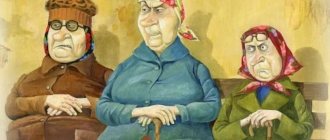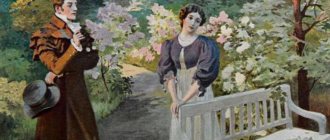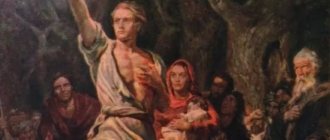“When I grow up, I will definitely become...” Such phrases can often be heard from children who dream of being athletes, teachers, doctors or chefs. But the older the child gets, the more difficult it is for him to answer this question unambiguously. How to find your life path? How to choose a profession that suits your liking? Every person faces such complex and at the same time simple questions. Therefore, if the problem of choosing a profession arises, arguments from the literature will come in handy.
The meaning of labor
G. A. Maslov once said that among all the decisions a person makes, there is not a single one more important than when he determines which path to take. Maslov is indeed right. There is nothing more important than choosing a profession. It’s just that, being in front of him, many wonder about the meaning of work in life. Everyone must answer for themselves. When faced with the problem of choosing a profession, arguments from the literature can help a little.
For example, one can recall A. Platonov’s story “In a Beautiful and Furious World.” The main character, driver Maltsev, loves his profession and is completely devoted to it. One day he loses his sight, and only after returning to the driver’s cabin of his favorite locomotive does he regain the ability to see. Reading this work, I can’t even believe that this happens, but it’s obvious: what you love can do even the impossible to a person.
Maxim Gorky once said: you need to love what you do, and then even the roughest and dirtiest work will turn into art. And as you know, real art is always admired.
The problem of the transience of human life
Each of us believes that his life path will be long and successful. But sometimes we are faced with situations where it is obvious how fleeting and unpredictable human life is. The circumstances of the death of Berlioz, one of the heroes, clearly demonstrate this to us
. Confident in his future and even more so in how he will spend the evening, the well-read editor is ready to argue with a stranger about the suddenness of human death. But very little time passes, and Berlioz’s head rolled along the pavement. The gentleman from San Francisco, the hero of the story of the same name by I. A. Bunin, could hardly have foreseen how the long-awaited cruise would end. The confidence that a luxurious trip is a well-deserved reward in his life overwhelms him. But fate decrees otherwise. A luxurious dinner ends with the sudden death of the hero. His body is placed in a soda box. Life is over.
How to choose a profession?
When the problem of choosing a profession arises, arguments from the literature will not lead to an answer as to what exactly a person needs to become. But nevertheless, without them it is difficult to navigate in this world.
Literary critic Obruchev said that a person should give preference to the profession that best suits his natural inclinations, only then will the work bring pleasure. And it doesn’t really matter what it will be. If a person has a thirst for knowledge and an active life position, then any work will be a joy.
The problem of choosing a profession (arguments from literature) is expressed especially clearly in Chekhov’s story “Ionych”. The main character of the work had a dream to serve people and acquired an excellent profession - he became a doctor. But when he moved to a big city, he saw that educated people were limited in their opportunities. The hero does not find the strength to resist this way of life and is forced to eke out a simple philistine life: he thinks little about his patients, and he works carelessly.
Perhaps this is one of the main problems in choosing an occupation: if a person does not have perseverance, does not have the desire to learn something new, to work conscientiously, then, no matter what profession he chooses, he will be destined to live the life of a simple man in the street.
About choosing a profession (according to the text by E. Grishkovets)
Every person has the right to choose the profession that he likes best. And the opinion of others is not decisive - it is simply taken into account. It is the problem of the complexity of choosing a specialty that E. Grishkovets reflects on in the text proposed for analysis.
The main character of the story never thought about what he would do in life. It was believed that he would follow in the footsteps of his grandparents or one of his parents. Even by the end of his studies, he had not made his choice. “I don't know what I wanted. Nothing definite... I wanted a fun and interesting life, I wanted learning to be not very difficult and not very boring.” With this example, the author shows that the hero of the story did not know where to go to study next. And I chose the faculty according to the principle “easy and fun.” It was like every other place where open days were held, until the last one remained - the philological one. Everything here was uninteresting to him, until he found out what the students would do in class. Read books! Associate Professor of the Department of Literary Theory Darwin announced this: “We will do this not just like that, but professionally. We will also discuss what we read.” Of course, Darwin’s words could not help but interest the hero and made a certain impression on him, so he went to study at the philology department.
Both examples, complementing each other, make it clear that a person himself and only himself must decide who to be. And be guided by only one thing - is it interesting to you or not, whether your heart is in this business or not.
The author brings the reader to the conclusion: choosing a profession is a serious step. And it must be done in such a way that everything comes together: interests, abilities, and opportunities. If you can’t immediately make a choice, then you should go through all the options, as the hero of the text did.
And one cannot but agree with this. When you choose a profession, you choose your destiny. If the choice is correct, then fate will be happy. Doing what you love, benefiting people, achieving success and setting new goals - what could be better!
Thus, we come to the conclusion: in order to avoid difficulties in choosing a profession, you need to correctly determine your interests and abilities. What about the advice of grandparents? What about the examples that parents give? It's all at your discretion.
Right to make mistakes
But sometimes it happens differently: a person simply does not understand which job he likes best. Then the problem of choosing a profession arises. Arguments from literature, “The Master and Margarita” in particular, suggest that everyone has the right to make a mistake.
It is worth remembering one of the heroes of Bulgakov’s novel, Ivan Bezdomny. He works as a writer at MASSOLIT. One day he comes to the realization that his poems are simply terrible, and no matter how hard he tries, he won’t be able to do anything better. You no longer want to pick up a pen, and a previously interesting activity becomes the most hated. And only after a conversation with Woland he decides to change his specialty and becomes a historian, which, in fact, he is very pleased with.
This is another problem of choosing a profession. Sometimes a person chooses something for which he does not have special abilities. Yes, he can work, but sooner or later the task will turn into real torture.
V.A. Kaverin "Two Captains"
In the novel by V.A. Kaverin considers the issue of choosing a future profession for Sanya Grigoriev and his friend Valka Zhukov to be especially vital. Valentin is an enthusiastic boy, he is constantly attracted to new and new areas of knowledge. But in the end he chooses biology and becomes a professor. Sanya takes a very long time to make her choice. While still mute, he repeatedly listened to a letter telling about the expedition of Captain Tatarinov. As a teenager, he gets the idea that it is much easier to reach the North Pole by plane than by dog cart. And this decides his fate. He devotes all his time to his main goal - to become a pilot. Considering himself short, he goes in for sports, trains tirelessly, and prepares to answer all questions about the structure of the aircraft. As a result, he becomes a pilot and achieves his goal. This is how a childhood dream becomes the meaning of one’s whole life.
L.N. Tolstoy "Adolescence"
The hero of the autobiographical story, Nikolenka Irtenyev, on the verge of growing up, faces the choice of the future work of his life. Gifted with a rich spiritual world, he dreams of becoming a useful and socially significant person. He imagines himself as “a great man, discovering new truths for the benefit of all mankind, and with a proud consciousness of his dignity.” The main character is preparing to enter the Faculty of Mathematics, only because “I really like the words: sines, tangents, differentials, integrals, etc..” Subsequently, life will show that the choice made in this way is wrong. Book by L.N. Tolstoy convinces us to choose our life path more responsibly.
M.A. Bulgakov "The Master and Margarita"
Life is a long journey that you want to walk with responsibility for every day. Sometimes sudden changes occur on the path of life, after which a person realizes that the main thing is ahead. This is what happened to the Master. He lived most of his life working in one of the Moscow museums. He was a historian by training and was involved in translations, as he knew five languages. One day, having won a lot of money, he decided to devote himself to his favorite pastime: writing a novel about Pontius Pilate. Another hero of the novel, Ivan Bezdomny, a writer, even a poet, got involved in Griboedov, selling his mediocre works to Berlioz, taking advantage of all the benefits of MASSOLIT. But the meeting with Woland, the death of Berlioz, and then the acquaintance with the Master changed Ivan’s life, he became a historian, stopped writing his mediocre poems and devoted his life to science: he became an employee of the Institute of History and Philosophy, a professor - Ivan Nikolaevich Ponyrev. The full moon worries him every month, but he knows something no one else knows. Bulgakov makes it clear that choosing a profession is a complex matter and not always clear-cut.
Reading in the section:
- The problem of the relationship between fathers and children. Arguments for writing the Unified State Examination
- The problem of the role of human memory. Arguments for writing the Unified State Examination
- The problem of the influence of nature on humans. Arguments for writing the Unified State Examination
- The problem of a teacher's influence on a student's education. Arguments for writing the Unified State Examination
- The problem of the influence of music on humans. Arguments for writing the Unified State Examination
- Arguments on the topic “Friendship and Enmity.” To the final essay
- The problem of overcoming life's difficulties during the war years. Arguments for writing the Unified State Examination
Previously published in the section:
- The problem of mercy. Arguments for writing the Unified State Examination
- The problem of the transience of time. Arguments for writing the Unified State Examination
- The problem of the nature of genius. Arguments for writing the Unified State Examination
- The problem of human resilience in life. Arguments for writing the Unified State Examination
- The problem of a scientist's responsibility for a scientific discovery. Arguments for writing the Unified State Examination
- The problem of the influence of music on humans. Arguments for writing the Unified State Examination
New section materials:
- Arguments "Courage and Cowardice". To the final essay
- Arguments "Ends and Means". To the final essay
- Arguments “Indifference and Responsiveness”. To the final essay
- Arguments "Loyalty and betrayal". To the final essay
- The problem of early adulthood during war. Arguments for writing the Unified State Examination
There is no talent without perseverance
And you should not flatter yourself with hopes that if you are praised for something, then this is a calling, which will soon become a talent and a favorite profession. Behind every outstanding person there is not only awareness of his skill, but also remarkable work.
As Honore de Balzac said, there are no talented people who lack willpower.
The problem of choosing a profession can be very difficult. Arguments from fiction confirm this:
- In this matter it is worth remembering Evgeny Onegin. A man of extraordinary intelligence, with the noble goal of bringing benefit to people, is left alone with his personal tragedy. As the author correctly noted, “he was sick of work.”
- Being in his circle, Evgeniy never learned to work hard, achieve what he wanted, selflessly give good and live for the benefit of others. That is why his life has turned into dreary everyday life that passes. And again we remember the words of the author: “No tears, no life, no love.”
Everyone will have to face the problem of choosing a profession. In this case, we can give only one piece of advice: if there is an activity that brings true pleasure, and a person is ready to become better for the sake of it, then it is worth choosing this particular job. The main thing is not to turn what you love into another social absurdity with your laziness and lack of initiative.
Problem Arguments
All our actions are influenced by the world around us. Before taking this or that step, we will definitely think about whether it contradicts the norms of social relations, conscience, morality, etc. This is all a problem of moral choice. The arguments here are simple. A wise man once said that there is never a right decision. Because for you it will be true, but for others it will be false. Let's see what literature teaches us.
| Problem name | Argument | |
| Humanity, mercy | The best examples are given by M. Sholokhov. He has several stories from which one can draw ideas about mercy and humanity. This is “The Science of Hate”, “The Fate of Man”. | |
| Cruelty | Sometimes circumstances force a person to commit cruel and terrible acts. It's hard to find such arguments. The problem of choice arose among the heroes of M. Sholokhov’s epic novel “Quiet Don”. The action takes place during the years of the revolution, and the main characters have to sacrifice something in the name of the revolution. | |
| 3. | About dreams and reality | Here you can’t do without A. Green’s romantic story “Scarlet Sails”. But what would have happened if Gray had never appeared in Assol’s life? In reality this does not happen. Of course, dreams sometimes come true, but you need to put a lot of effort into it yourself. |
| 4. | The fight between good and evil | Two elements are always fighting in us - good and evil. Think about your actions and you will find arguments. The problem of choice also faced the heroes of Bulgakov’s novel “The Master and Margarita”. This is an excellent work in which the branches of good and bad deeds are very skillfully intertwined. |
| 5. | Self-sacrifice | And again “The Master and Margarita”. A woman left her home, wealth and family for the sake of her beloved. She became weightlessness, a shadow, and sold her soul to the devil for the sake of her Master. The work makes you think. And one more story that I would like to remember in this context. This is Gorky's "Old Woman Izergil". The brave hero Danko tore his heart out of his chest to save people, thanks to which the path was illuminated and everyone was saved. |
Problems of choice in human life
Think about it, how often in a day do you have to solve questions to which there are two or even more answers? First you think about what to eat for breakfast, then how to dress for school and which way to go there. After classes, you usually wonder whether to do your homework now, or after the party? Should I go for a walk with Masha or Kolya today? All these issues are just minor daily problems that you can surely handle easily.
But in life there are more serious choices. Sooner or later, you will have to think about where to go to study, where to work, how to determine your path in life. We need to think about this now, on the threshold of adulthood. This is why teachers ask students to read works at school, analyze them and draw conclusions. So that in the future it will be easier for you, based on the experience of others. We invite you to consider the problem of life choice found in literature. We present the arguments as examples.
Personal problems
The most painful topic for teenagers is love. At the same time, it is the most interesting thing to write about. And how many examples can you give! Love and romantic relationships are another matter of choice. The essay is forced to be written based on one’s own thoughts, which are sometimes confused and mixed up. Let's consider what arguments can be given in this context.
I immediately want to remember the tragic love of Romeo and Juliet in Shakespeare's play. Misunderstanding on the part of relatives and enmity between clans lead to tragic consequences, although the young people were sincerely in love and experienced only the most tender and virginal feelings for each other.
An excellent example of a real romantic relationship in Kuprin’s story “The Garnet Bracelet”. After reading this work, I want to believe that love is the best feeling that has ever arisen in a person. “Garnet Bracelet” is an ode to the young, a hymn to happiness and prose of innocence.
Love is sometimes destructive. There are arguments for this in the literature. The problem of choice appeared before Anna Karenina in the novel of the same name by L.N. Tolstoy. The feelings that arose for the young officer Volkonsky became destructive for her. For the sake of new happiness, a woman abandoned her devoted husband and beloved son. She sacrificed her status, reputation, position in society. And what did you get for it? Love and happiness or sadness and disappointment?







